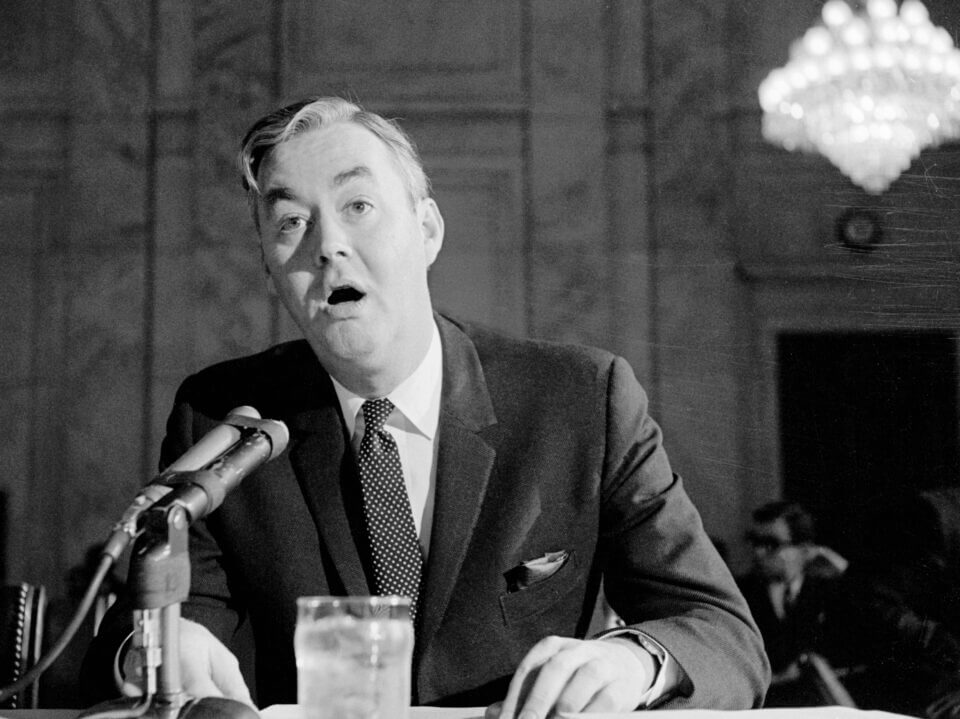
“We can only hope that Daniel Patrick Moynihan’s approach to politics will be rediscovered. Books like American Burke should function as essential guides in this most necessary search.”
Burkean Liberalism: A Sorely Missed Strain of Political Thought
In this month’s Vice Presidential debate, Vice President Mike Pence interrupted his and Senator Kamala Harris’s train of evasions to reprimand his counterpart: “Senator Harris, you’re entitled to your own opinion, but you’re not entitled to your own facts.” The original line Vice President Pence was consciously paraphrasing comes from the late Harvard professor, presidential counselor, U.S. ambassador to India and the United Nations, and Democratic Senator from New York Daniel Patrick Moynihan. How ironic that a variation of Moynihan’s line—“Everyone is entitled to his own opinion, but not to his own facts”—has made its way onto the 2020 campaign trail.
Why ironic? Because both the Left and the Right have strayed distressingly far from the core tenets of Moynihan’s unique brand of political thought. This is why reading Greg Weiner’s 2015 book, American Burke: The Uncommon Liberalism of Daniel Patrick Moynihan, is a simultaneously illuminating and frustrating experience. Weiner expertly introduces readers to the political thought of the late Senator. Although an unfailing believer in the capacity of the federal government “to ameliorate economic distress and … enhance civic life,” Moynihan’s was a liberalism allergic to promises of utopia and devotions to full-fledged statism. Moynihan stressed the limitations of what government could do and the importance of giving civil society space to breathe. This is how “Burkean” and “liberal” can co-exist as apt labels of the late scholar-turned-statesman’s political thought. Moynihan’s acceptance of the limitations of public policy stemmed from his commitment to empirics. Facts—even uncomfortable ones—were the guiding lights of Moynihan’s political thought. For Moynihan, abstractions were to be avoided; empirical reality comprised the grounds off of which political opinions and public policies were to be constructed.
Weiner’s ability to outline, probe, and explain the political thought of Moynihan to his readers is what makes this précis of Moynihan’s thinking so worthwhile yet frustrating. It is difficult not to feel disappointed when closing American Burke because, as Weiner himself notes, Moynihan’s unique “blend of hues associated with both liberalism (possibilities linked with governmental action) and conservatism (limitations born of respect for social complexity)” has all but faded from the public square here in the 21st century.
The political right has thrown in its lot with a shameless man (as well as his enablers and mimics), whose form of politics is not exactly geared towards the shoring up of a flourishing civil society. “I alone can fix it” are not the words of a Burkean conservative, and it is unsurprising that in 2016, President Donald Trump enjoyed his most fervent support from areas of the country where levels of social trust are low and the extent of social alienation is staggeringly high. Nor might it be hyperbolic to assert, as Bill Kristol did in The Bulwark this September, that American conservatism has died for the time being. It has devolved into “an accomplice to, an apologist for, and an enabler of Trump’s nativist, populist, unconservative, and illiberal authoritarianism,” which “is as far from Burke as from Hayek.”
Meanwhile, though tempered by the nomination (and hopefully the presidency) of former Vice President Joe Biden, the energy on the political left is clearly trending in the direction of unthinking, centralized planning, and catering to group-based grievances. This is not the form of liberalism championed by Moynihan.
We are forced to confront a political reality, as described by the likes of Francis Fukuyama, where populist grievance is ascendant on the right and identitarian grievances attuned to hierarchies of victimhood are gaining steam on the Left. Thus, readers of American Burke would be right to worry that the “uncommon liberalism” embodied by Moynihan and drawn out by Weiner might be lost to American politics—never to be found again. However, Weiner clearly does not want us to despair. He writes, “American politics is impoverished for the loss of Burkean liberalism and would be enriched by its reclamation.” The hope is that elucidating Moynihan’s thought might underscore how badly needed a Moynihan-esque approach to politics is in the here and now. I share this hope.
Moynihan was undoubtedly a principled political thinker, despite what some of his detractors may have claimed, and his principles were unapologetically liberal ones—liberal in the 20th-century, New Deal-style sense of the word.
Squaring Liberal Commitments with Burkean Insights
The two words that continually come to mind when reading Weiner’s survey of Moynihan the political thinker are principles and competence. Moynihan was undoubtedly a principled political thinker, despite what some of his detractors may have claimed, and his principles were unapologetically liberal ones—liberal in the 20th-century, New Deal-style sense of the word. Moynihan never questioned government’s role in protecting the civil rights of its citizens and combatting material deprivation. Indeed, he took umbrage at 1980’s-era Reaganite assertions that “Government is not the solution to our problem, government is the problem.” As Weiner writes, “The essence of [Moynihan’s] liberalism lay in his belief in government as an agent of amelioration and progress.”
This belief shines through in Moynihan’s writings regarding family structure, poverty, and social policy, most notably in his 1986 book-length adaptation of his Harvard University Godkin Lectures, Family and Nation. Moynihan forcefully pushed back against the notion—quite prevalent at the time (and now still) in many right-learning circles—that government interventions to reduce or ameliorate poverty had, in fact, exacerbated poverty by fostering dependence and familial disintegration. This perspective had acquired its foremost advocate in Charles Murray’s 1984 book, Losing Ground: American Social Policy, 1950-1980.
Always the empiricist, Moynihan was not impressed; “the data [were] not at all conclusive.” After all, Harvard’s David Ellwood and Larry Summers had found in 1984 that the proportion of children receiving Aid to Families with Dependent Children (AFDC) benefits had held rather constant throughout the 1970’s as family breakdown accelerated, leading them to question the validity of Murray’s thesis. Moynihan also noted that he, himself, had detected the alarming rate of family breakdown throughout American society in his oft-maligned The Negro Family: The Case for National Action (“The Moynihan Report”), completed in March of 1965. In short, the “clearly recognizable statistical trends” in family breakdown which Murray attributed to the unintended, nefarious impacts of social welfare programming had emerged well before the Johnson administration got to work on the Great Society.
But Moynihan’s principled belief in government’s ability to ameliorate social ills and material depravity had a limiting principle of its own: competence. Moynihan stressed in his writings and public life that government must vigorously attend to the tasks for which it is, in fact, suited, but not much else. Weiner writes that for Moynihan, “It was…imperative to separate what government could competently do from what it could not—as much to ensure government did competently what it could do as to prevent it from undertaking the impossible.” Moynihan harbored no illusions as to the capabilities of government. As part of his 1973 collection of essays, Coping: Essays on the Practice of Government, Moynihan wrote:
“The stability of a democracy depends very much on the people making a careful distinction between what government can do and what it cannot do. To demand what can be done is altogether in order: some may wish such things accomplished, some may not, and the majority may decide. But to seek that which cannot be provided, especially to do so with the passionate but misinformed conviction that it can be, is to create the conditions of frustration and ruin. What is it that government cannot provide? It cannot provide values to persons who have none, or who have lost those they had. It cannot provide a meaning to life. It cannot provide inner peace. It can provide outlets for moral energies, but it cannot create those energies.”
In short, politics and government could not serve the ends of religion—a fact lost on too many here at the close of the second decade of the 21st century.
For Moynihan, the limits of government’s competence are not only restricted to the ends it may serve but also to the means it employs to carry out its rightful tasks. Writing in Coping, Moynihan noted that “The Federal government is good at collecting revenues, and rather bad at disbursing services. Therefore, we should use the Federal fisc as an instrument for redistributing income between different levels of government, different regions and different classes.”
Moynihan advocated social insurance over social engineering. Weiner illuminates the distinctions Moynihan drew between these two forms of governmental action in American Burke, writing that Moynihan objected to “the shift that occurred in liberal thinking somewhere between the New Deal and the Great Society. The New Deal offered amelioration, at which government was good because government was good at raising revenue and cutting checks. The Great Society offered programs around which constituencies—often professional, middle-class groups with interests distinct from those of the people the programs were intended to help—accreted. They micromanaged; they agitated; they were envious of nonstate actors.”
Embedded within Moynihan’s critique of the Great Society’s approach to liberal policymaking was his appreciation for societal complexity, and this is where the Burkean label really sticks. Weiner writes:
“Moynihan’s appreciation for limits was inextricably linked to his recognition of the complexity of the social organism and the inherent difficulty of manipulating it politically. Here, we arrive at a decisive supposition for Moynihan’s thought and, especially, the character of it that blends a Burkean perspective into his liberal one. Like Burke—again, the claim is compatibility, not influence—Moynihan accepted the limitations that complexity imposed on human understanding and the human capacity to manipulate social mechanisms.”
Moynihan was acutely attuned to the Tocquevillian fears of democracy’s tendency towards simplism and statism. This is why empirical facts had to be respected and why government had to appreciate the molding institutions of civil society, like the church and the family. Indeed, in works such as his 1980 edition of Counting Our Blessings: Reflections on the Future of America, Moynihan critiqued both his fellow liberals’ role in the federal government’s assault on non-public education and the Supreme Court’s First Amendment jurisprudence that sought to erect a “wall of separation” between church and state. For Moynihan, institutions like churches, families, and Catholic schools were essential “little platoons” of society, not obstacles to be overcome in some misguided quest to bulldoze all of the buffers between the individual and the state.
Paging Mr. Moynihan
American Burke not only provides an indispensable guide to understanding one of the most incisive political thinkers to have ever graced American politics; it also is an implicit call to action to reasonable citizens on both the political left and the political right. As Weiner laments the disappearance of Moynihan’s “uncommon liberalism” from our public life, one can feel him advising his readers that it may be high time to resurrect it. In fact, there is a case to be made that the immediate post-Trump era of American politics could provide fertile soil for a long-overdue flowering of Mr. Moynihan’s Burkean liberalism.
Moreover, if rising stars like Missouri Senator Josh Hawley have their way, the GOP will begin thinking even more seriously about forging a pro-worker agenda amenable to redistributive efforts.
For one, the blue-collar conservatism trumpeted by President Trump (more on the 2016 campaign trail than in his actual governing decisions) is not allergic to vigorous redistributive efforts on the part of government. And if the GOP maintains its grip on the white working class, it will have a hard time rediscovering its Reagan-era posture of fiscal restraint when it comes to domestic, social welfare spending. (Having read Family and Nation, I would be remiss to pretend that the Reagan administration was a beacon of fiscal restraint across the board; Moynihan made quite clear that Reagan’s profligate defense spending helped usher in the steep budget deficits of the 1980’s.) Moreover, if rising stars like Missouri Senator Josh Hawley have their way, the GOP will begin thinking even more seriously about forging a pro-worker agenda amenable to redistributive efforts.
Meanwhile, both the mainstream and the democratic socialist left flank of the Democratic Party seem ready and willing to engage in large-scale redistribution. Although Vice President Biden won the party’s 2020 presidential nomination as a moderate, his was a moderation of style more than substance. It is fair to say that his platform does not shy away from robust governmental activism.
And as wages stagnate and poverty worsens in the face of the Coronavirus (COVID-19) and our ensuing economic malaise, it is easy to see how liberal, ameliorative governmental proposals stand to gain support. Thus, the question that those disposed to Moynihan’s approach to politics ought to ask is two-fold.
First, will the efforts to enhance upward mobility and reduce poverty center more on Moynihan-style redistribution or top-down planning? It is one thing to implement straightforward, Social Security-style programs that empower the federal government to do two of the things which it does best: Collecting taxes and cutting checks. It is a wholly different matter to establish additional regulatory regimes and service distribution organizations.
And second, will a more energetic federal government more attuned to its redistributive role wrongfully seek to crowd out civil society and tamp down the legitimate, albeit differing, ways of life peppered across our vast nation; or will it allow—even encourage—the flourishing of our differences and our many private associations? Moynihan coupled his liberal belief in the ameliorative role that government could and should play with a commitment to the “little platoons” of civil society celebrated by Burke. It remains unclear whether would-be reformers are willing to do the same. A litmus test might be whether those supposedly committed to lifting Americans out of poverty will acknowledge basic facts that Moynihan readily pointed to—such as the role that non-public schools (particularly Catholic schools) have played in breaking cycles of poverty and the importance of family structure in determining children’s life trajectories—and promoting policies and programs that align with such realities.
Perhaps they will not, and we will fall back on our contempt-ridden culture wars, hyperbolic rhetoric, and unthinking orthodoxies. We can only hope that Daniel Patrick Moynihan’s approach to politics will be rediscovered. Books like American Burke should function as essential guides in this most necessary search.
Thomas Koenig is a recent graduate of Princeton University and will be attending Harvard Law School in the fall of 2021. He can be found on Twitter @TomsTakes98










